Gardening enthusiasts know that growing healthy and vibrant cucumbers starts with the right care and nourishment. In this blog, we’ll delve into the world of organic fertilizers, exploring why they are essential for successful cucumber cultivation. We’ll discuss the benefits of using organic options, provide tips on their application, and review some of the best products available on the market. Whether you’re a seasoned gardener or a novice, this guide will equip you with the knowledge needed to yield an abundant and delicious cucumber harvest.
What is the Best Fertilizer for Cucumber Plants?
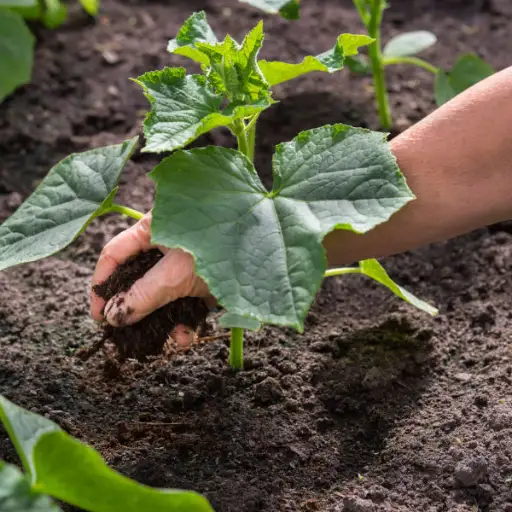
Why Organic Fertilizer is Good for a Cucumber
Organic fertilizers are good for cucumbers because they contain a balanced, slow release of key nutrients that stimulates regular growth and lasting health. Organic options do not have the negative side effects of synthetic fertilizers such as enhanced soil structure, improved microbial activity and increase water holding capacity of the soil among others. They are eco-friendly and hence no harmful runoff or chemical build up in the soil. They also add organic matter which helps to maintain healthy garden ecosystem leading to higher yields and tastier cucumbers.
5 Best Organic Fertilizers for Growing Cucumbers
Compost
Compost is highly recommended as an organic fertilizer that supplies the soil with different types of nutrients. It improves soil structure and promotes root development by introducing it to decomposed organic materials. Making one at home from kitchen leftovers combined with yard waste can be inexpensive and can be a great option when cultivating cucumbers in an environmentally friendly manner.
Worm Castings
Boosting cucumber growth is another reason why worm castings are great for them. Worm castings are rich in nitrates, phosphorus, magnesium, potassium, calcium among other essential plant food elements needed for good plant development and healthy growing conditions. Worm casting has improve water retention ability within the soils reducing their susceptibility to plant pathogens thereby ensuring healthier cucumber plants.
Fish Emulsion
Fish emulsion fertilizer contains major nutrients such as nitrogen, phosphorous and potassium. This liquid fertilizer gives an instantaneous nutrient boost to cucumber plants resulting in lush foliage and strong roots. Fish emulsion is particularly beneficial during the early stages of plant growth and can be easily applied by mixing with water then watering your plants.
Bone Meal
Bone meal is one example of an organic fertilizer that comes from meat industry wastes; it has high levels of phosphorous (P2O5)and calcium(Ca). It supports extensive root system development while enhancing flower formation which is important for cucumber plants. Bone meal should be worked into the soil before planting to provide a long-lasting nutrient source that will support cucumber growth throughout the season.
Kelp Meal
Kelp meal is derived from seaweed, and it has high levels of potassium (K) and minor elements. It also contains auxins that help cucumbers to grow well in different types of soils. Kelp meal can be mixed into the soil or used as a foliar spray, making it a versatile addition to your organic fertilization regimen. This use stimulates vigorous growth, higher yield and resistance to pests and diseases.
Choosing the Right Fertilizer for Your Vegetable Garden
When choosing the right fertilizer for your vegetable garden, consider specific needs of your plants as well as condition of your soil. They are composted organic materials or animal waste products; they promote balanced nutrition in the plant while improving on soil structure. Compost provides beneficial nutrients and microorganisms necessary for plant development while manure is rich in nitrogen required by leafy vegetables. Liquid fertilizers such as fish emulsion are available instantly for quick nutrient boost hence promoting vigorous growth. By testing your soil prior you can identify any deficiencies therefore helping you tailor fertilization strategies that will enhance optimal plant health and productivity.
How to Fertilize Cucumbers for Best Results?
Understanding Nutrient Needs of Cucumber Plants
For successful growth and yields, it is important to understand the nutrient needs of cucumbers as they are heavy feeders. First, make sure that your soil drains well and is rich in organic matter. Cucumbers need nitrogen, phosphorus and potassium in balanced quantities. Nitrogen is needed for vine and leaf growth; phosphorous supports healthy root systems and flowering; while potassium improves plant health and resistance to diseases. Apply a complete fertilizer or apply organic amendments such as compost or aged manure to satisfy these requirements. In addition, incorporation of trace minerals like magnesium and calcium will prevent common problems such as blossom end rot. Further support good nutrient uptake by regularly monitoring soil pH and moisture levels so that your cucumber plants can flourish during the growth season.
When And How To Fertilize Cucumbers
In order to achieve the best results fertilize cucumbers at the following primary stages:
- Before Planting: One week before planting mix the soil with balanced slow release fertilizer This first feeding ensures that there is a good foundation for those young plants.
- After Germination: Once the cucumber seedlings develop their first true leaves, apply a balanced liquid fertilizer to them so that they grow well from the beginning.
- During Flowering: A higher phosphorous fertilizer should be used when plants start flowering till full bloom occurs. This should be done twice monthly during flowering until fruiting stage.
- Mid-Growing Season: About midway through growing season provide an extra boost either by side-dressing with compost or applying a balanced water-soluble fertilizer that will keep them vigorous producing high yields.
By adhering to this timetable you ensure that crucial development periods receive essential nutrients fostering strong stems and abundant harvests for your cucumber vines. Regularly check soil moisture and nutrient levels so you can adapt your fertilization schedule as required.
How Liquid Fertilizer Should Be Used On Cucumber Seedlings
Using liquid fertilizer on cucumber seedlings is simple to do and can largely boost their growth if done properly. Below are the steps:
- Dilute the Fertilizer: Prepare the liquid fertilizer as per the manufacturer’s instructions usually this requires taking a given quantity of concentrate then adding water to dilute it creating a safe solution for young seedlings.
- Application: Apply diluted fertilizer directly into the soil around the base of seedlings and not onto them so that roots will take in nutrients where they are needed most.
- Timing: For minimal leaf burn risk and efficient nutrient absorption by plants, prefer early morning or late afternoon hours to fertilize.
- Frequency: The first set of true leaves are formed; begin using balanced liquid fertilizer on the growing cucumbers. Early stages should be fertilized every two weeks.
- Monitor and Adjust: Observe seedlings for signs of nutrient deficiency or over fertilization such as yellowing leaves or stunted growth. Adjust your schedule for feeding them by decreasing their frequency or increasing concentration according to what happens.
These steps guarantee that your cucumber seedlings receive enough nutrition for strong healthy growth and thus you prepare yourself for a productive season in terms of yields.
Which Nutrients Do Cucumbers Need to Thrive?
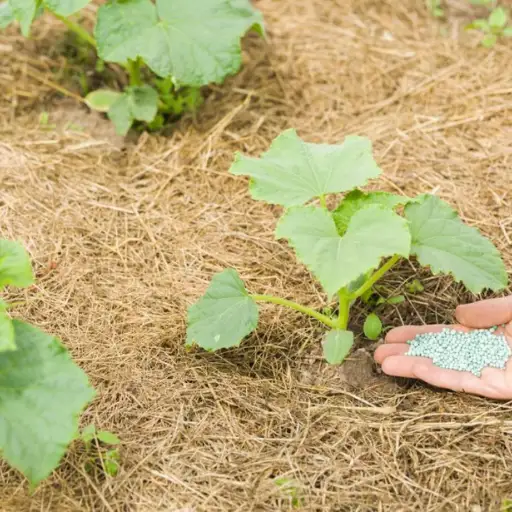
The Role of Nitrogen, Phosphorus and Potassium
It is very important to understand the appropriate role of nutrients in order to grow healthy cucumber plants. In particular, cucumbers thrive when three vital nutrients are present: nitrogen, phosphorous, and potassium.
- Nitrogen (N): It aids vigorous leaf growth as well as overall plant development. Chlorophyll which is needed for photosynthesis contains nitrogen as a crucial component. Cucumber plants need adequate amounts of nitrogen for producing lush green foliage which is essential for their health.
- Phosphorus (P): This nutrient is fundamental for strong root development and flowering. During flower budding and fruiting, phosphorus supports energy transfer in cucumbers. Healthy root systems are maintained by it and promotes the formation of flowers that will later develop into more fruits.
- Potassium (K): It contributes greatly to fruit quality and overall plant health. Water regulation, protein synthesis as well as resistance against diseases all depend on potassium among other functions it performs. Juicier and more flavorful cucumbers result from firm plants with an efficient water uptake system that they achieve through potassium’s assistance in making them stable.
Striking a proper balance of these key nutrients would ensure thriving cucumber plants yielding plentiful high-quality fruits.
The Importance of a Balanced Fertilizer
A balanced fertilizer is important for the well-being and productivity of cucumber plants. A balanced fertilizer consists an equal or proportional mixture of Nitrogen (N), Phosphorous (P) and Potassium (K) thus guaranteeing an all-round supply of these necessary elements to the vegetation; this helps promote vigorous growth in the plant, sturdy root system development as well as production of high-quality fruits.Compared with deficiencies leading to stunted growths in certain areas like poor flowering or low fruit yields when there is a regular supply of essential nutrient uptake through fertilization with balanced fertilizers.Cucumbers require a ratio close to 10-10-10 or 12-12-12 in fertilizer to give them maximum vigor and the greatest chance of a productive season.
Organic Compost: A Nutrient-Rich Solution
No garden is complete without organic compost as it provides a plethora of nutrients that enhance healthy plant growth. Compost contains nitrogen, phosphorous, potassium and many other trace elements which are never found in synthetic fertilizers making it rich in essential elements for soil fertility. Soil structure is improved by the presence of organic matter in compost leading to moisture retention and beneficial microbial activity. It strengthens root systems and builds resistance against pests and diseases. By adding organic compost into the soil, gardeners not only reduce their dependence on chemical fertilizers but also encourage sustainable and eco-friendly gardening methods. Whether homemade or bought from stores, organic compost plays a vital role in growing strong cucumber plants that produce good yields while maintaining overall garden health at the same time.
How to Prepare Soil Before Planting Cucumbers?
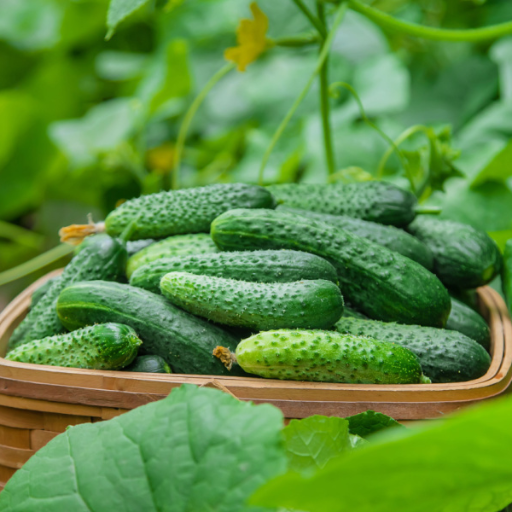
Advantages of Adding Manure to Your Soil
Your cucumber plants growth can increase considerably by adding manure to your soil. For plant growth manure is rich in vital elements such as nitrogen, phosphorus and potassium. It also amends soil structure increasing organic matter content that improves aeration and water holding capacity. The nutrients in manure are released slowly over time thus ensuring that plants receive steady nutrition for healthy vigorous growth. Similarly, it encourages the activity of beneficial microorganisms in the soil hence promoting nutrient accessibility as well as disease resistance. The use of well-composted manure minimizes the risk of introducing new diseases and creates a more balanced nutritional profile therefore is an ideal choice for preparing soil before planting cucumbers.
How to Test and Adjust Soil pH
Testing and adjusting soil pH is an important aspect of proper cucumber cultivation. Here’s a short guide based on current top information sources:
Testing Soil pH:
- Soil Test Kit: Buy a soil test kit from a garden center or online store. Follow the kit’s instructions for taking your soil sample from your backyard garden. Based on this kit’s reading, you will know if your soil is acidic, alkaline or neutral.
- pH Meter: Alternatively, you could use the digital pH meter; insert its probe into moistened ground waiting until it indicates some value. Aim for cucumbers which require any value between 6.0-7.0.
Adjusting Soil pH:
- Lowering pH (Acidifying Soil): To acidify the soil include amendments like elemental sulfur or aluminum sulfate according to product guidelines that will provide rates depending on its current pH and desired level.
- Raising pH (Alkalizing Soil): If soils have high acidity incorporate agricultural lime (calcitic or dolomitic) which increases their Alkalinity based on use package recommendations.
To maintain nutrient availability one has to regularly re-test the soils and adjust accordingly resulting into healthier and more productive cucumber plants.
Using Slow-Release Fertilizers for Long-Term Growth
Slow-release fertilizers are an important component of long-term cucumber plant growth. These fertilizers slowly release nutrients over time, providing the plants with essential elements throughout their growth and development without the risk of nutrient runoff or leaching. As per information from top sources:
- Nutrient Supply Consistency: This allows growers to use slow release fertilizers that offer steady nutrient supply thereby reducing the need for frequent application of fertilizers. It also helps in promoting strong root development and vigorous growth during the entire growing season.
- Types of Slow-Release Fertilizers: They include coated granules, organics (like composted manure and bone meal) and synthetic options. Coated granules are made to break down by microbial action or moisture contact resulting in nutrient release.
- Application Guidelines: Apply slow-release fertilizers at planting time following the product instructions provided by an average manufacturer. Spread it uniformly on the soil surface or mix it into top few inches of soil. Watch out for recommended rate to avoid applying excessive amounts of fertilizer which may damage plants.
By incorporating slow-release fertilizers into your garden routine, you can provide a continuous balanced supply of nutrients to cucumbers over time leading to healthier cucumbers that yield better as they mature.
Can Fertilizing Help with Pest Control in Cucumber Plants?
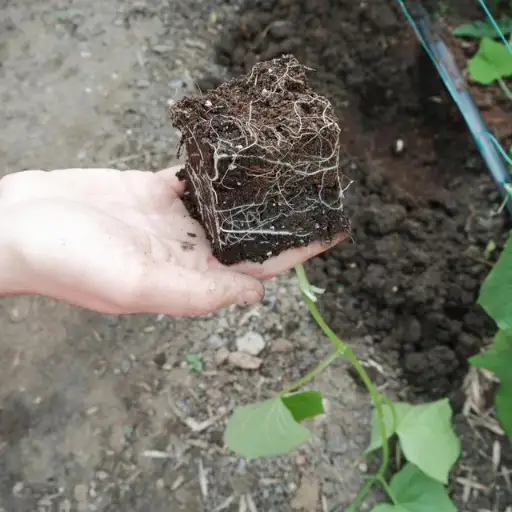
The Role of Nutrient Deficiency in Pest Problems
Nutrient deficiencies can be responsible for pests’ problems with cucumber plants. Through my experience and research, I have realized that plants without the necessary nutrients could be more susceptible to various pest attacks. For example, lack of nitrogen will make plants less strong and robust, making it easier for the pests to attack them. Inadequate potassium levels on the other hand are a cause of impaired water regulation by the plant which leads to weak cell walls that facilitate access by pathogens .Maintaining good nutrient supply through proper fertilization is important for ensuring healthy plants and resilience against pests. My cucumber plants become much stronger and naturally resistant to pests due to their balanced nutrient levels.
Organic Fertilizers as well as Natural Pest Deterrents
According to my findings organic fertilizers serve two purposes- they nurture cucumber plants while discouraging natural pests. Manuring cucumbers using compost, manure or bone meal are some examples of organic fertilizing techniques that do not only give the crops required nutrition elements such as Nitrogen (N), Phosphorous (P) and Potassium (K) but also improve microbial activity in soils. This improves soil fertility and creates better growing environment for cucumbers making them resilient against pests outbreaks. In addition, some organic substances namely neem oil and diatomaceous earth double up as soil enhancers and repellants or pesticides respectively when used in gardens. This way, I am able to keep healthy cucumber crops throughout every season while minimizing pest damage risks.
Tips for Healthy Cucumber Plants Maintenance
There are several important practices that have proved useful in maintaining healthy cucumber plants.Firstly,cucumbers need regular watering; therefore,I make sure soil is uniformly moist but not soaking wet.Underneath these crops ,mulching helps prevent moisture loss at same time keeping weeds off.Secondly,I normally rotate the crop each season so as not to allow soil-borne diseases to become established.Sufficient spacing between plants encourages air flow thus reducing fungus growth.Also,by pruning the lower leaves and encouraging vine training to take place vertically, it will lead in more air as well as sunlight penetration into the foliage.Lastly, I always monitor pests with organic pest control measures such as bringing natural enemies or applying repellants according to need to prevent their attack. Through these methods, I can support my cucumber plants in growing vigorously and productively.
Frequently Asked Questions (FAQs)
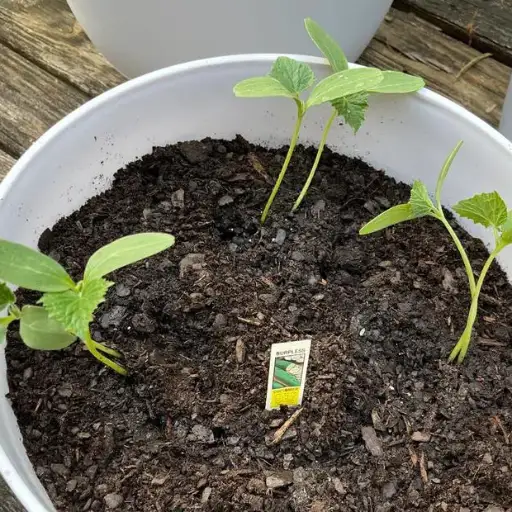
Q: Is it important to use different types of fertilizers at varying stages of cucumber growth?
A: Yes, in different phases of growth the nutritional requirements may differ. Nitrogenous fertilizers enhance the growth of leaves during early growing period while mature crops require potassium-based fertilizers more to support fruit set.
Q: Can I use tomato feed for my cucumbers?
A: Yes, tomatoes feeds can be used for fertilizing cucumbers because they usually have good amounts of NPK that are essential in fruiting vegetables. This category is aimed at both tomatoes and other fruits like cucumbers.
Q: Which is the best fertilizer to use on cucumbers cultivated in a greenhouse?
A: An excellent option when growing cucumbers in greenhouses is an organic liquid fertilizer. It supplies nutrients directly to plants and guarantees their sufficiency under controlled conditions.
Q: What should I think about when selecting a fertilizer for container gardening with cucumber?
A: For container gardening with cukes, either go for a liquid organic or well balanced granular fertilizer. These do not only contain nutrients that are easily taken up by potted cukes but also offer them at total disposal.
Q: How do I choose the right type of fertiliser for my cucumber plant?
A: When looking for the best fertilizer for your type of cucumber plant, consider organic options with balanced NPK suitable for fruiting vegetables or search recommendations specific to your variety from literature.
Q: Can you provide me with some tips on feeding smaller pots or containers?
A:Yes, small pot cukes will obtain instant food if sprayed with liquid organic feeds as water is absorbed quickly into plants through foliar spraying process. Moreover, containers dry out faster hence demand frequent watering cycles as well as regular nourishment through feedings.






